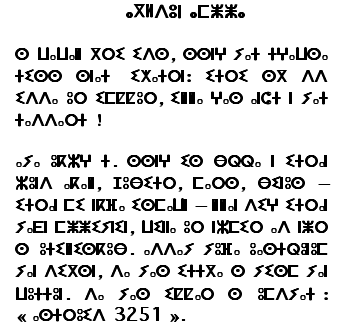
Tifinagh in use
A BBC News piece [1] on the teaching of “Berber” languages [2] in Morocco has got the blogoma talking. The article, which outlines the educational options for learning and studying the language, and adds insight into the development of the Tifinagh [3] alphabet, prompted a variety of posts. The View from Fez, an expat blog, asked the question [4] “could Berber replace Arabic as official Moroccan language?” The blogger's answer?
The simple answer is no, Amazigh will never replace Arabic, but that does not stop people calling for it to happen. In a recent BBC interview, Abullah Aourik, an artist and publisher of a magazine in Amazigh, said that he wanted to see Berber replace Arabic as the official language of the country.
The blogger noted, however, that Amazigh languages are already counted among the official languages of several neighboring countries, including Algeria.
Reading Morocco, a blog which focuses on Moroccan literature, news, and blogs, was quick to criticize [5] the article:
I have a few problems with the premise of the article(as usual). I am not so quick to draw a line between Berbers and Arabs when so much of Moroccan history has been about the mixture of these two ” identities,” and also because i feel as if secular and Christian missionary motives (which both tend to be Islamophobic) like sticking their finger in this cultural and religious “rift.”
‘Aqoul‘s response was that of criticism as well:
First, if there was a real and genuine desire to have a written form of Berber languages that would in fact have some impact on illiteracy, and real reach beyond a few faddish academics and cultural activists, they would have adopted either the Latin alphabet, or if they wanted to go for real historical authenticity, adopted the form of Arabic script that late Medieval and early Modern Chleuh Berbers used to write Chleuh (Tachelhite).
Kal, a commenter on the post (and the blogger behind The Moor Next Door [6]), shares anecdotes heard in rural Morocco as to the teaching of Tifinagh:
If one talks to these kids coming from the illiterate villages in the mountains and south, it has been my experience that they are quite weary of official attempts to educate them in Tamazight; why not teach them to read and write in a language they can use first, rather than marring them down with a language that doesn't take them anywhere beyond where they're already at? I have heard multiple people from the Sousse describe the attempt to teach Tamazight and promote Tifinagh as a “conspiracy” to keep already debilitated Berber communities as they are. Whatever the validity of that, there is also a hostility to towards standardization, which means rolling over the languages of childhood and daily life towards a dubious and poorly defined end.
For those interested, a fascinating read on the subject is Katherine E. Hoffman's We Share Walls: Language, Land, and Gender in Berber Morocco [7].